Boyle J.A. The Cambridge History of Iran, Volume 5: The Saljuq and Mongol Periods
Подождите немного. Документ загружается.

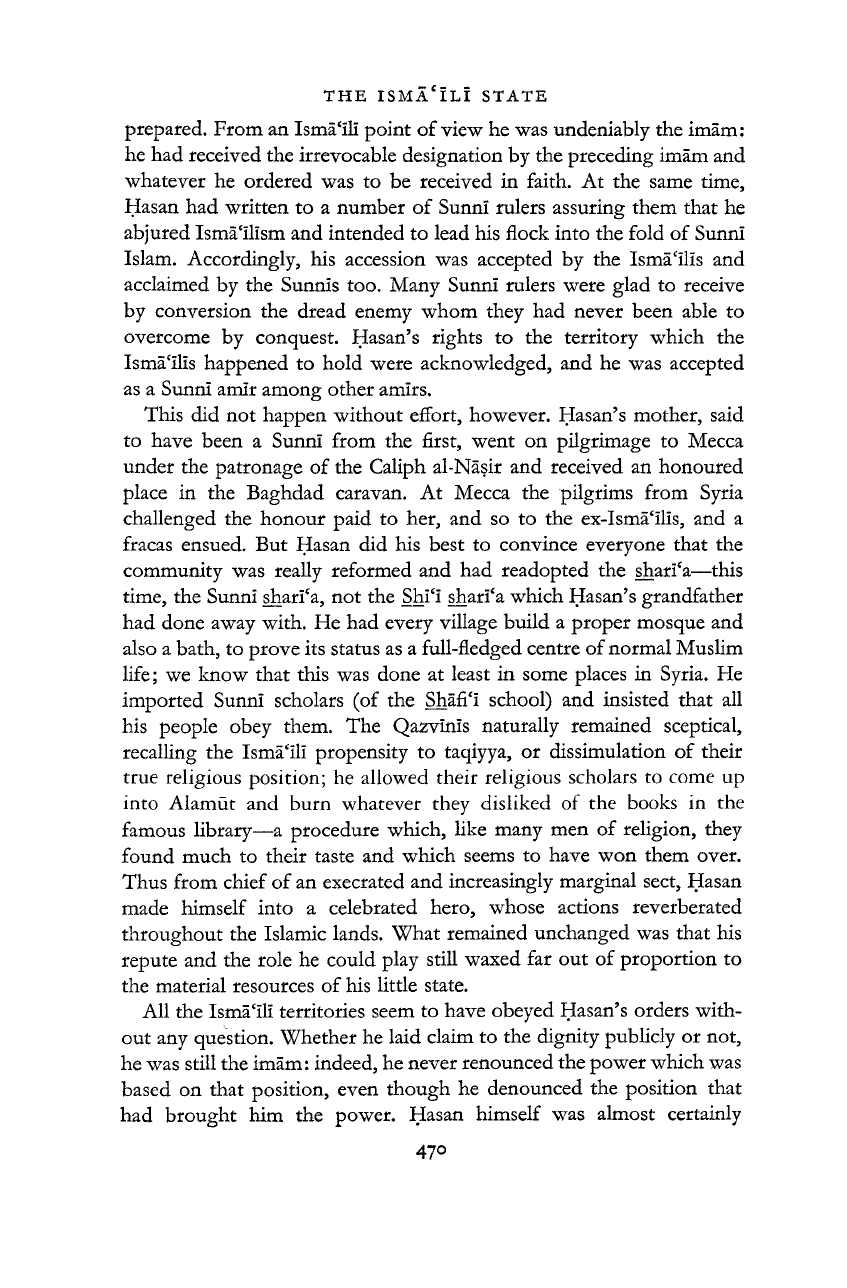
THE
ISMA'ILI
STATE
470
prepared. From an Isma'ili point of
view
he was undeniably the imam:
he had received the irrevocable designation by the preceding imam and
whatever he ordered was to be received in faith. At the same time,
Hasan had written to a number of Sunni rulers assuring them
that
he
abjured Isma'Illsm and intended to lead his
flock
into the fold of Sunni
Islam. Accordingly, his accession was accepted by the Isma'llls and
acclaimed
by the Sunnis too. Many Sunni rulers were glad to receive
by
conversion the dread enemy whom they had never been able to
overcome
by conquest. Hasan's rights to the territory which the
Isma'llls happened to hold were acknowledged, and he was accepted
as a Sunni amir among other amirs.
This
did not happen without effort, however. Hasan's mother, said
to have been a Sunni from the first, went on pilgrimage to Mecca
under
the patronage of the Caliph al-Nasir and received an honoured
place in the Baghdad caravan. At Mecca the pilgrims from Syria
challenged the honour paid to her, and so to the ex-lsma'llls, and a
fracas ensued. But Hasan did his best to convince everyone
that
the
community was really reformed and had readopted the sharl'a—this
time, the Sunni sharl'a, not the Shi'I sharl'a which Hasan's grandfather
had done away with. He had every village build a proper mosque and
also a bath, to prove its
status
as a full-fledged centre of normal Muslim
life;
we know
that
this was done at least in some places in Syria. He
imported Sunni scholars (of the Shafi'I school) and insisted
that
all
his people obey them. The Qazvinis naturally remained sceptical,
recalling
the Isma'ili propensity to taqiyya, or dissimulation of their
true
religious position; he allowed their religious scholars to come up
into Alamut and
burn
whatever they disliked of the books in the
famous library—a procedure which, like many men of religion, they
found much to their
taste
and which seems to have won them over.
Thus from
chief
of an execrated and increasingly marginal sect, Hasan
made himself into a celebrated hero, whose actions reverberated
throughout the Islamic lands. What remained unchanged was
that
his
repute
and the role he could play still waxed far out of proportion to
the material resources of his little state.
All
the Isma'ili territories seem to have obeyed Hasan's orders with-
out any question. Whether he laid claim to the dignity publicly or not,
he was still the imam: indeed, he never renounced the power which was
based on
that
position, even though he denounced the position
that
had brought him the power. Hasan himself was almost certainly
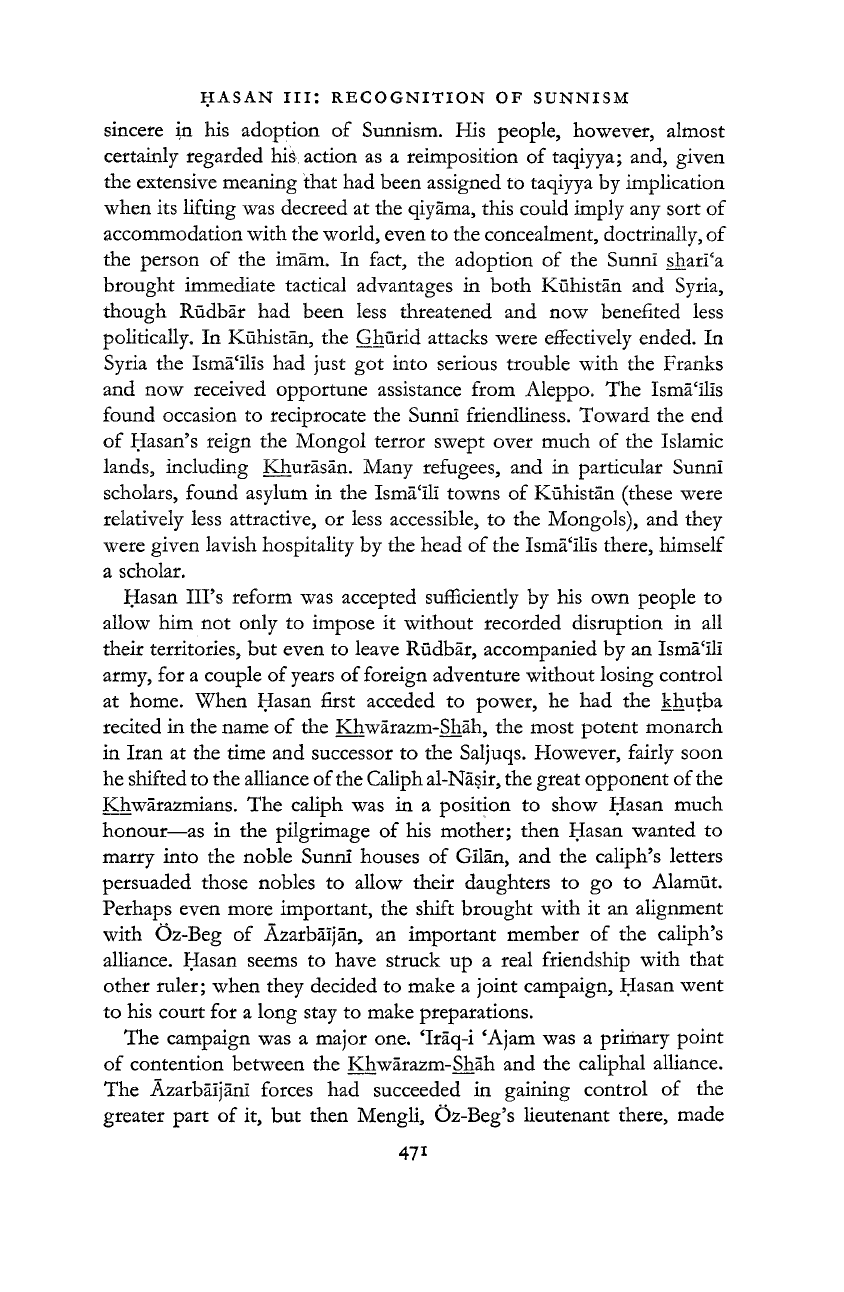
HASAN
III:
RECOGNITION
OF
SUNNISM
sincere in his adoption of Sunnism. His people, however, almost
certainly regarded his action as a reimposition of taqiyya; and, given
the extensive meaning
that
had been assigned to taqiyya by implication
when its lifting was decreed at the qiyama, this could imply any sort of
accommodation with the world, even to the concealment, doctrinally, of
the person of the imam. In fact, the adoption of the Sunni sharfa
brought immediate tactical advantages in both Kuhistan and Syria,
though Rudbar had been less
threatened
and now benefited less
politically.
In Kuhistan, the Ghurid attacks were
effectively
ended. In
Syria
the Isma'ilis had just got into serious trouble with the Franks
and now received opportune assistance from
Aleppo.
The Isma'Ilis
found occasion to reciprocate the Sunni friendliness. Toward the end
of
Hasan's reign the Mongol
terror
swept over much of the Islamic
lands, including Khurasan. Many refugees, and in particular Sunni
scholars, found asylum in the Isma'ili towns of Kuhistan (these were
relatively
less attractive, or less accessible, to the Mongols), and they
were given lavish hospitality by the head of the Isma'ilis there, himself
a scholar.
Hasan Ill's reform was accepted sufficiently by his own people to
allow
him not only to impose it without recorded disruption in all
their territories, but even to leave Rudbar, accompanied by an Isma'ili
army, for a couple of years of foreign adventure without losing control
at home. When Hasan first acceded to power, he had the khutba
recited in the name of the Khwarazm-Shah, the most potent monarch
in
Iran
at the time and successor to the Saljuqs. However, fairly soon
he shifted to the alliance
of
the
Caliph
al-Nasir, the great opponent
of
the
Khwarazmians.
The caliph was in a position to show Hasan much
honour—as in the pilgrimage of his mother;
then
Hasan wanted to
marry into the noble Sunni houses of Gilan, and the caliph's letters
persuaded those nobles to allow their daughters to go to Alamut.
Perhaps even more
important,
the shift brought with it an alignment
with
Oz-Beg
of Azarbaijan, an
important
member of the caliph's
alliance.
Hasan seems to have struck up a real friendship with
that
other ruler; when they decided to make a joint campaign, Hasan went
to his court for a long stay to make preparations.
The
campaign was a major one. 'Iraq-i
'Ajam
was a primary point
of
contention between the Khwarazm-Shah and the caliphal alliance.
The
Azarbaijani forces had succeeded in gaining control of the
greater
part
of it, but
then
Mengli,
Oz-Beg's
lieutenant there, made
47*
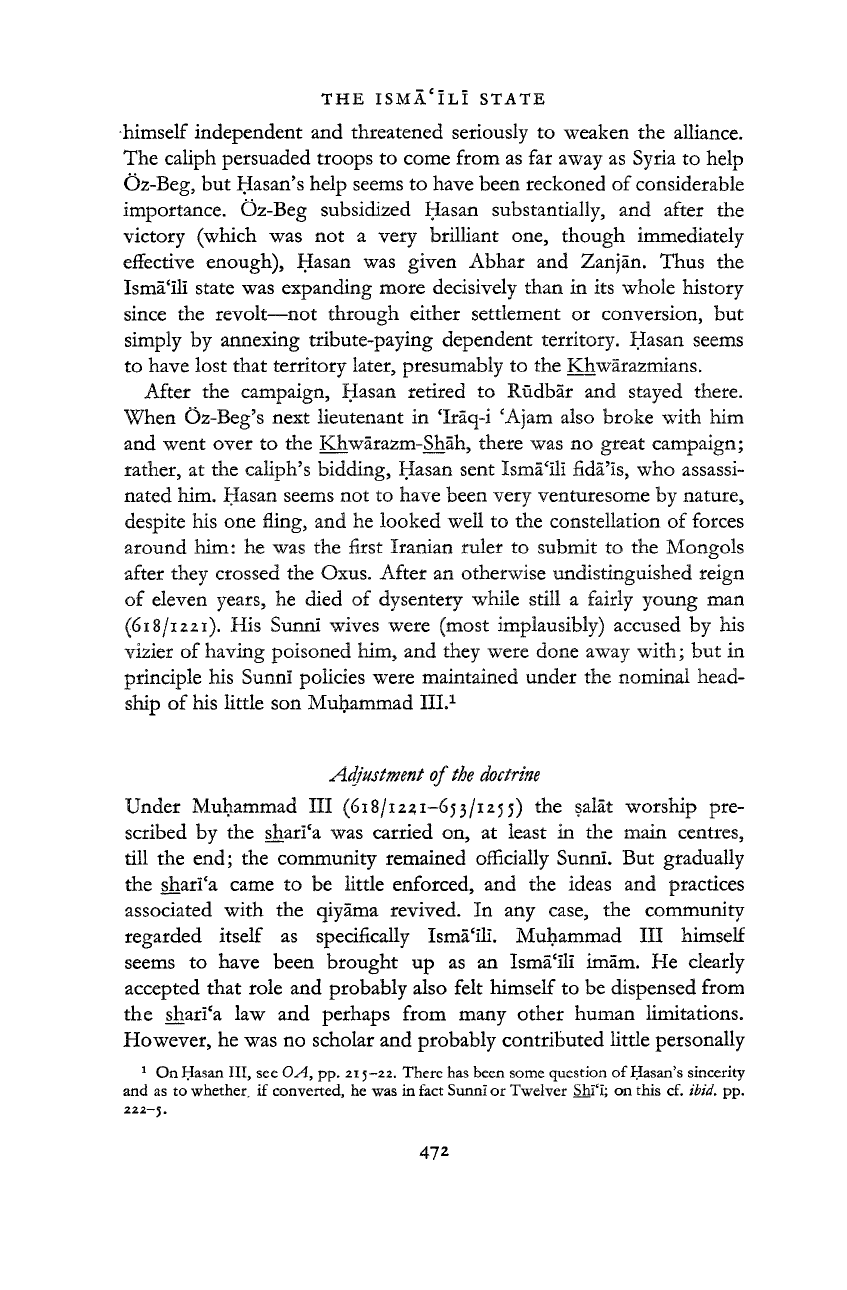
THE ISMA'IL! STATE
472
-himself
independent and threatened seriously to weaken the alliance.
The
caliph persuaded troops to come from as far away as Syria to help
Oz-Beg,
but Hasan's help seems to have been reckoned of considerable
importance.
Oz-Beg
subsidized Hasan substantially, and after the
victory
(which was not a very brilliant one, though immediately
effective
enough), Hasan was
given
Abhar and Zanjan. Thus the
Isma'Ili
state
was expanding more decisively
than
in its whole history
since
the revolt—not through either settlement or conversion, but
simply
by annexing tribute-paying dependent territory. Hasan seems
to have lost
that
territory later, presumably to the Khwarazmians.
After
the campaign, Hasan retired to Rudbar and stayed there.
When
Oz-Beg's
next lieutenant in
c
Iraq-i
'Ajam
also broke with him
and went over to the Khwarazm-Shah,
there
was no great campaign;
rather,
at the caliph's bidding, Hasan sent Isma'ili fida'Is, who assassi-
nated him. Hasan seems not to have been very venturesome by
nature,
despite his one
fling,
and he looked
well
to the constellation of forces
around him: he was the first
Iranian
ruler to submit to the Mongols
after they crossed the
Oxus.
After
an otherwise undistinguished reign
of
eleven years, he died of dysentery while still a fairly young man
(618/1221).
His Sunni
wives
were (most implausibly) accused by his
vizier
of having poisoned him, and they were done away with; but in
principle his Sunni policies were maintained
under
the nominal head-
ship of his little son Muhammad III.
1
Adjustment
of
the
doctrine
Under Muhammad III
(618/1231-653/1255)
the salat worship pre-
scribed
by the sharfa was carried on, at least in the main centres,
till
the end; the community remained
officially
Sunni. But gradually
the sharfa came to be little enforced, and the ideas and practices
associated with the qiyama revived. In any case, the community
regarded itself as specifically Isma'ili. Muhammad III himself
seems to have been brought up as an Isma'ili imam. He clearly
accepted
that
role and probably also felt himself to be dispensed from
the sharfa law and perhaps from many other human limitations.
However,
he was no scholar and probably contributed little personally
1
On
Hasan
III, see OA, pp.
215-22.
There has been some question of
Hasan's
sincerity
and as to whether, if converted, he was in fact Sunni or Twelver Shl'I; on
this
cf.
ibid.
pp.
222-5.
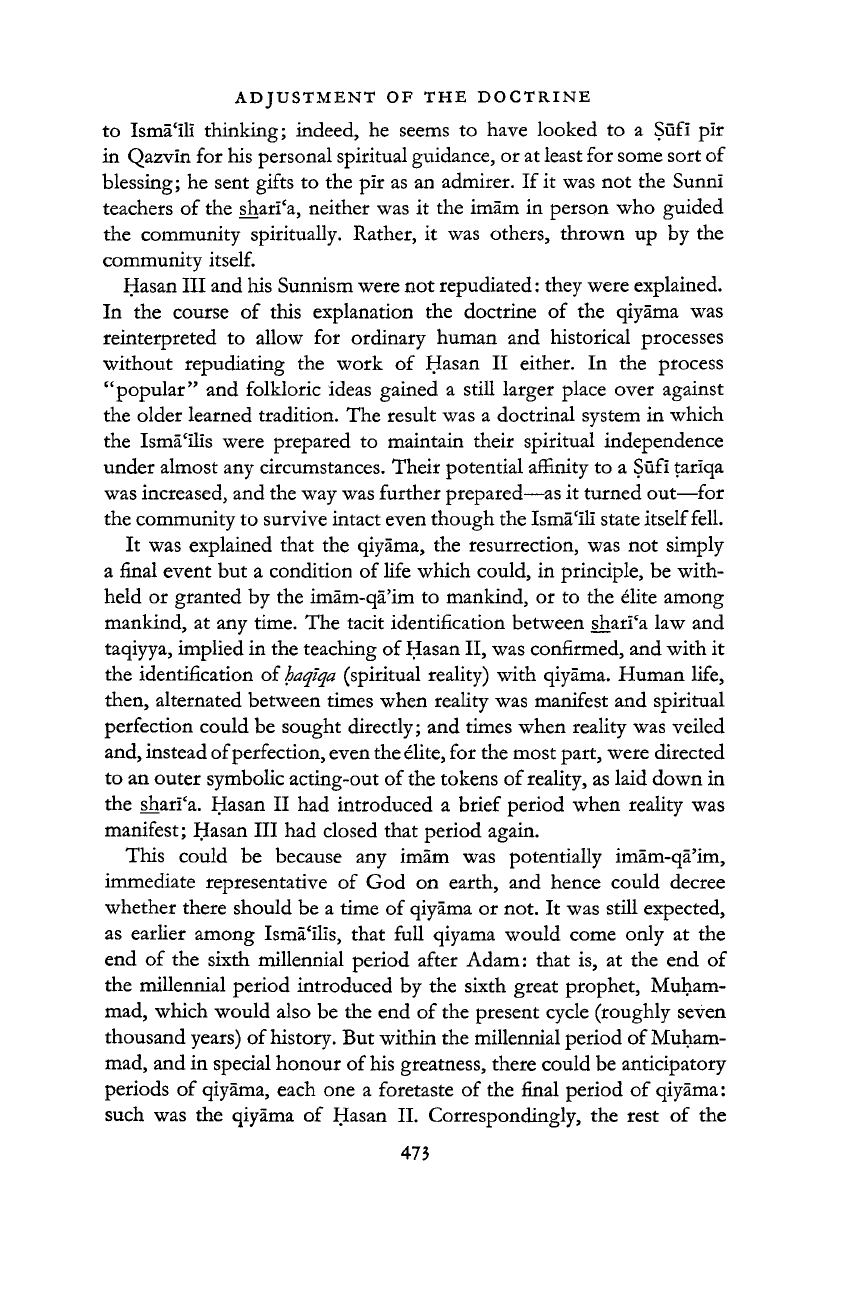
ADJUSTMENT
OF THE DOCTRINE
to Ismà'ilì thinking; indeed, he seems to have looked to a
Sufi
pir
in
Qazvin
for his personal spiritual guidance, or at least for some sort of
blessing;
he sent gifts to the pir as an admirer. If it was not the Sunni
teachers of the sharf a, neither was it the imam in person who guided
the community spiritually. Rather, it was others, thrown up by the
community itself.
Hasan III and his Sunnism were not repudiated: they were explained.
In the course of this explanation the doctrine of the
qiyàma was
reinterpreted to allow for ordinary human and historical processes
without repudiating the work of Hasan II either. In the process
"popular" and folkloric ideas gained a still larger place over against
the older learned tradition. The result was a doctrinal system in which
the Isma'ilis were prepared to maintain their spiritual independence
under
almost any circumstances. Their potential affinity to a
Sufi
tariqa
was
increased, and the way was further prepared—as it
turned
out—for
the community to survive intact even though the
Ismà'ili
state
itself
fell.
It was explained
that
the qiyàma, the resurrection, was not simply
a final event but a condition of
life
which could, in principle, be with-
held or granted by the
imàm-qa'im to mankind, or to the élite among
mankind, at any time. The tacit identification between sharf a law and
taqiyya,
implied in the teaching of Hasan II, was confirmed, and with it
the identification of
haqiqa
(spiritual reality) with qiyama. Human
life,
then, alternated between times when reality was manifest and spiritual
perfection could be sought directly; and times when reality was veiled
and, instead
of
perfection, even the
élite,
for the most
part,
were directed
to an outer symbolic acting-out of the tokens of reality, as laid down in
the sharf a. Hasan II had introduced a brief period when reality was
manifest; Hasan III had closed
that
period again.
This
could be because any imam was potentially imàm-qà'im,
immediate representative of God on
earth,
and hence could decree
whether
there
should be a time of qiyàma or not. It was still expected,
as earlier among Isma'ilis,
that
full
qiyama would come only at the
end of the sixth millennial period after Adam:
that
is, at the end of
the millennial period introduced by the sixth great prophet, Muham-
mad, which would also be the end of the present
cycle
(roughly seven
thousand years) of history. But within the millennial period of Muham-
mad, and in special honour of his greatness,
there
could be anticipatory
periods of
qiyàma, each one a foretaste of the final period of qiyàma:
such was the qiyàma of Hasan II. Correspondingly, the rest of the
473
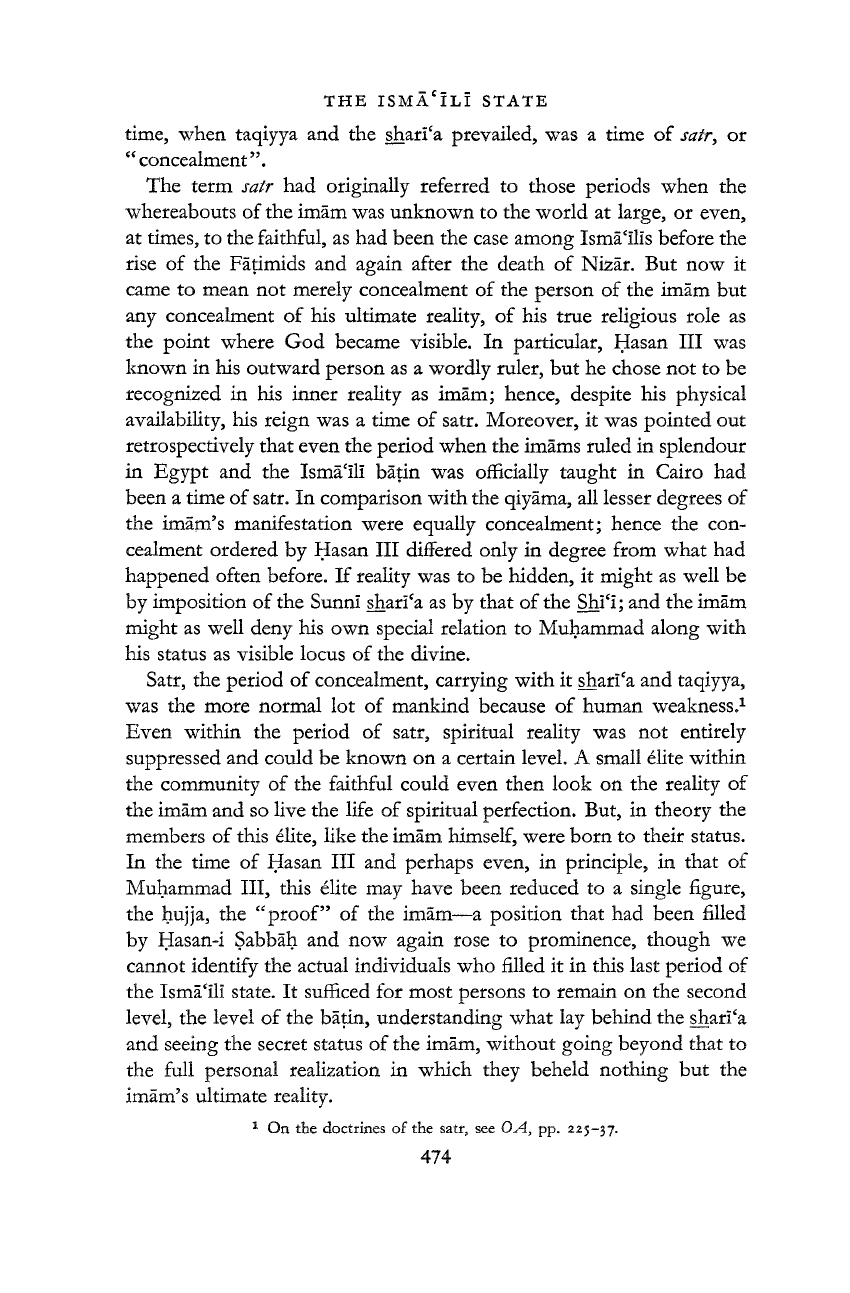
THE
ISMA'ILI
STATE
474
time, when taqiyya and the sharfa prevailed, was a time of
satr
y
or
"concealment".
The
term
satr
had originally referred to those periods when the
whereabouts of the imam was unknown to the world at large, or even,
at times, to the faithful, as had been the case among Isma'ilis before the
rise of the Fatimids and again after the death of Nizar. But now it
came to mean not merely concealment of the person of the imam but
any concealment of his ultimate reality, of his
true
religious role as
the point where God became
visible.
In particular, Hasan III was
known
in his outward person as a wordly ruler, but he chose not to be
recognized
in his inner reality as imam; hence, despite his physical
availability,
his reign was a time of
satr.
Moreover, it was pointed out
retrospectively
that
even the period when the imams ruled in splendour
in Egypt and the Isma'lli batin was
officially
taught in Cairo had
been a time of
satr.
In comparison with the qiyama, all lesser degrees of
the imam's manifestation were equally concealment; hence the con-
cealment ordered by Hasan III differed only in degree from what had
happened often before. If reality was to be hidden, it might as
well
be
by
imposition of the Sunni sharfa as by
that
of the
Shfi;
and the imam
might as
well
deny his own special relation to Muhammad along with
his
status
as visible locus of the divine.
Satr, the period of concealment, carrying with it sharfa and taqiyya,
was
the more normal lot of mankind because of human weakness.
1
Even
within the period of
satr,
spiritual reality was not entirely
suppressed and could be known on a certain
level.
A small elite within
the community of the faithful could even
then
look on the reality of
the imam and so
live
the
life
of spiritual perfection. But, in theory the
members of this elite, like the imam himself, were born to their status.
In the time of Hasan III and perhaps even, in principle, in
that
of
Muhammad III, this elite may have been reduced to a single figure,
the hujja, the "proof" of the imam—a position
that
had been
filled
by
Hasan-i Sabbah and now again rose to prominence, though we
cannot identify the actual individuals who
filled
it in this last period of
the Isma'ill state. It sufficed for most persons to remain on the second
level,
the
level
of the batin, understanding what lay behind the sharfa
and seeing the secret
status
of the imam, without going beyond
that
to
the
full
personal realization in which they beheld nothing but the
imam's ultimate reality.
1
On the
doctrines
of the
satr,
see OA, pp.
225-37.
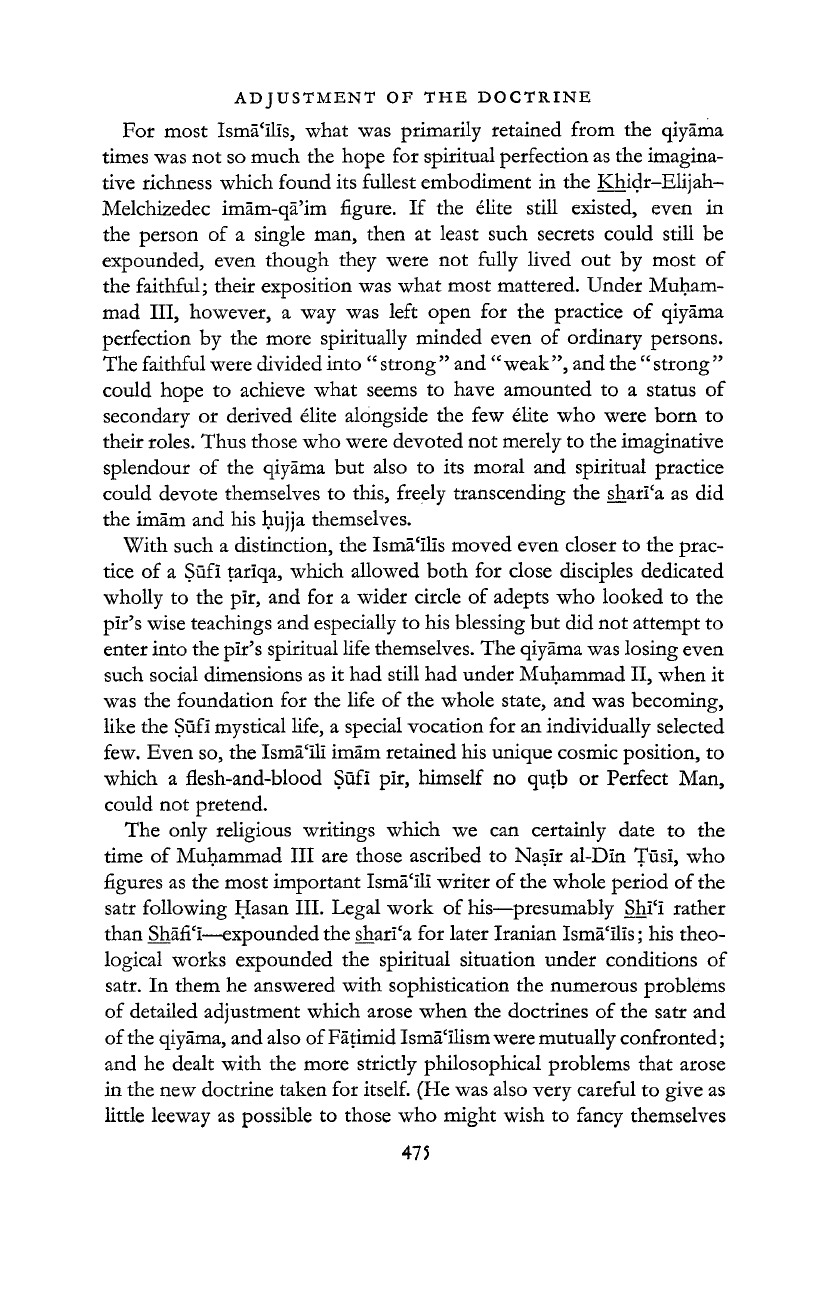
ADJUSTMENT
OF THE
DOCTRINE
For most Isma'ilis, what was primarily retained from the qiyarna
times was not so much the hope for spiritual perfection as the imagina-
tive
richness which found its fullest embodiment in the Khidr-Elijah-
Melchizedec
imàm-qà'im figure. If the élite still existed, even in
the person of a single man,
then
at least such secrets could still be
expounded, even though they were not fully lived out by most of
the faithful; their exposition was what most
mattered.
Under Muham-
mad III, however, a way was left open for the practice of qiyarna
perfection by the more spiritually minded even of ordinary persons.
The
faithful were divided into "strong" and "weak", and the "strong"
could
hope to achieve what seems to have amounted to a
status
of
secondary or derived
élite alongside the few élite who were born to
their roles. Thus those who were devoted not merely to the imaginative
splendour of the qiyarna but also to its moral and spiritual practice
could
devote themselves to this, freely transcending the sharf a as did
the imam and his hujja themselves.
With
such a distinction, the Isma'ilis moved even closer to the prac-
tice of a Sufi tariqa, which allowed both for close disciples dedicated
wholly
to the pir, and for a wider circle of adepts who looked to the
pir's wise teachings and especially to his blessing but did not
attempt
to
enter
into the pir's spiritual
life
themselves. The qiyarna was losing even
such social dimensions as it had still had
under
Muhammad II, when it
was
the foundation for the
life
of the whole state, and was becoming,
like
the Sufi mystical
life,
a special vocation for an individually selected
few.
Even so, the Isma'ili imam retained his unique cosmic position, to
which
a flesh-and-blood Sufi pir, himself no
qutb
or Perfect Man,
could
not
pretend.
The
only religious writings which we can certainly
date
to the
time of Muhammad III are those ascribed to Nasir al-Din Tusi, who
figures as the most
important
Isma'ili writer of the whole period of the
satr
following Hasan III.
Legal
work of his—presumably Shfi
rather
than
Shàffi—expounded the sharf a for later
Iranian
Isma'ilis; his theo-
logical
works expounded the spiritual situation
under
conditions of
satr.
In them he answered with sophistication the numerous problems
of
detailed adjustment which arose when the doctrines of the
satr
and
of
the qiyarna, and also
of
Fàtimid Ismà'ilism were mutually confronted;
and he dealt with the more strictly philosophical problems
that
arose
in the new doctrine taken for itself. (He was also very careful to
give
as
little leeway as possible to those who might wish to fancy themselves
475
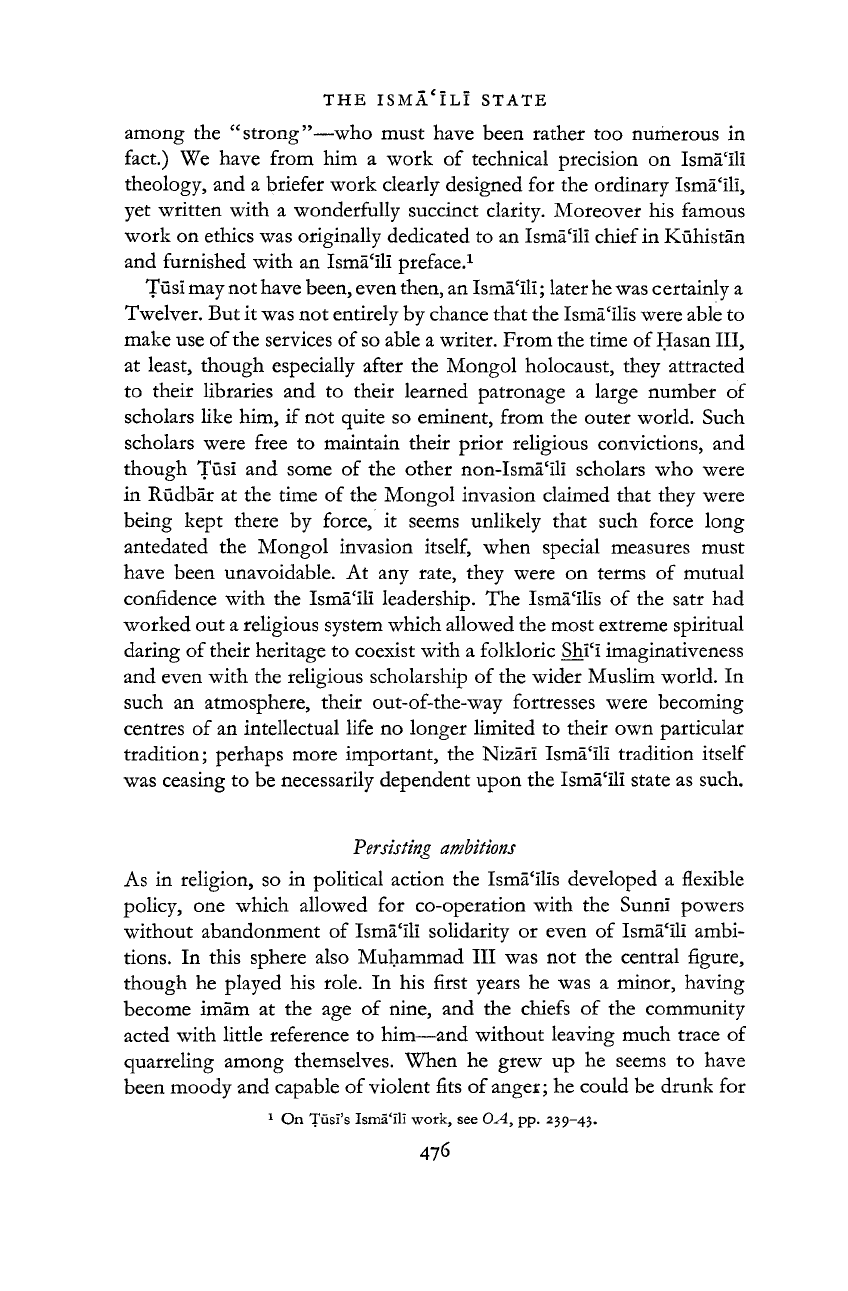
THE ISMÀ'ÌLÌ
STATE
among the "strong"—who must have been
rather
too numerous in
fact.)
We have from him a work of technical precision on Isma'ili
theology,
and a briefer work clearly designed for the ordinary Isma'ili,
yet
written with a wonderfully succinct clarity. Moreover his famous
work
on ethics was originally dedicated to an Isma'ili
chief
in Kiihistan
and furnished with an Isma'ili preface.
1
Tusi
may not have been, even then, an Isma'ili; later he was certainly a
Twelver.
But it was not entirely by chance
that
the Isma'ills were able to
make use of the services of so able a writer. From the time of Hasan III,
at least, though especially after the Mongol holocaust, they attracted
to their libraries and to their learned patronage a large number of
scholars like him, if not quite so eminent, from the outer world. Such
scholars were free to maintain their prior religious convictions, and
though Tusi and some of the other non-lsma'lll scholars who were
in Rudbar at the time of the Mongol invasion claimed
that
they were
being kept
there
by force, it seems unlikely
that
such force long
antedated the Mongol invasion itself, when special measures must
have been unavoidable. At any
rate,
they were on
terms
of mutual
confidence
with the Isma'ili leadership. The Isma'ills of the
satr
had
worked
out a religious system which allowed the most extreme spiritual
daring of their heritage to coexist with a folkloric
Shi'i imaginativeness
and even with the religious scholarship of the wider Muslim world. In
such an atmosphere, their out-of-the-way fortresses were becoming
centres of an intellectual
life
no longer limited to their own particular
tradition; perhaps more important, the Nizari Isma'ili tradition itself
was
ceasing to be necessarily dependent upon the Isma'ili
state
as such.
Persisting ambitions
As
in religion, so in political action the Isma'ills developed a flexible
policy,
one which allowed for co-operation with the Sunni powers
without abandonment of Isma'ili solidarity or even of Isma'ili ambi-
tions. In this sphere also Muhammad III was not the central figure,
though he played his role. In his first years he was a minor, having
become imam at the age of nine, and the chiefs of the community
acted with little reference to him—and without leaving much trace of
quarreling among themselves. When he grew up he seems to have
been moody and capable of violent fits of anger; he could be
drunk
for
1
On Tusi's Isma'ili work, see OA, pp.
239-43.
476
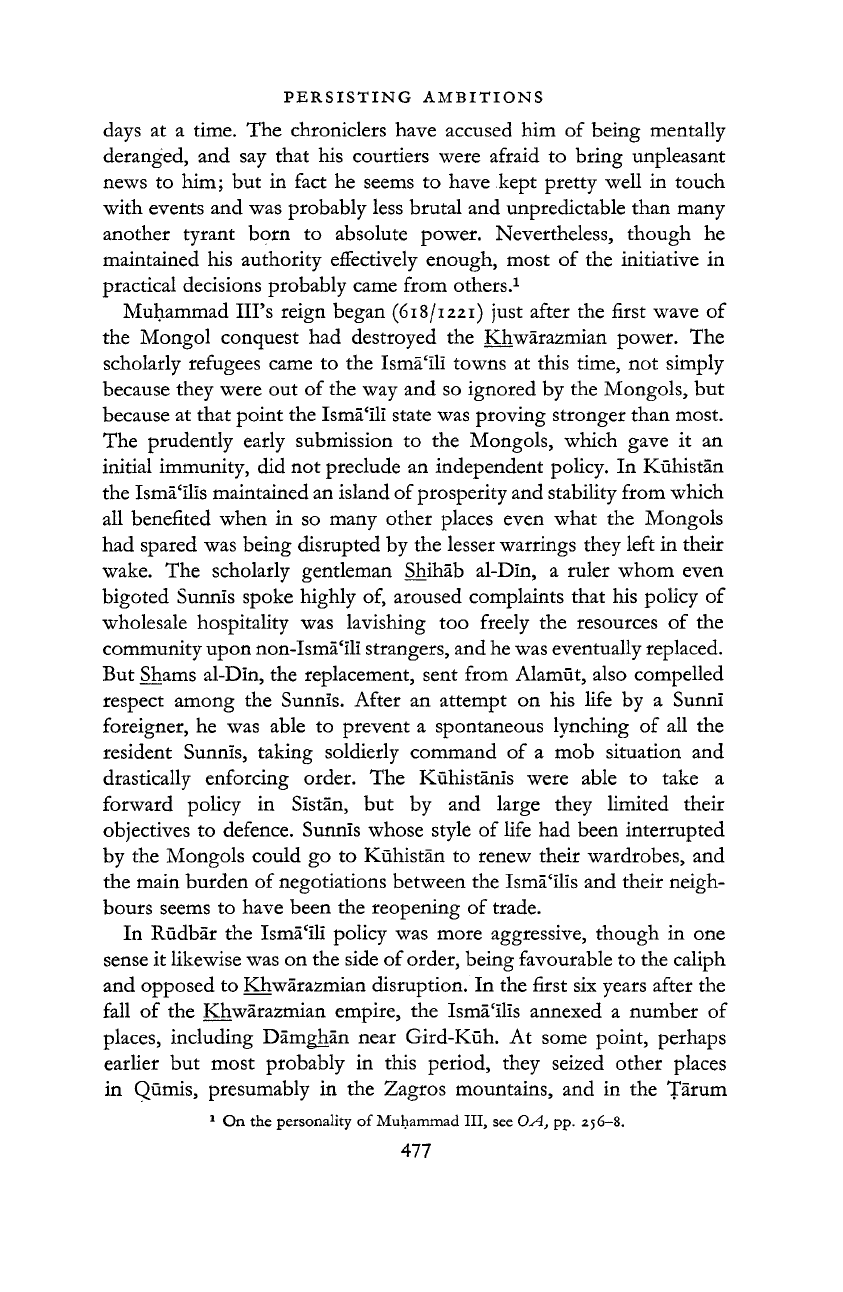
PERSISTING
AMBITIONS
477
days
at a time. The chroniclers have accused him of being mentally
deranged, and say
that
his courtiers were afraid to bring unpleasant
news
to him; but in fact he seems to have kept pretty
well
in touch
with
events and was probably less
brutal
and unpredictable
than
many
another
tyrant born to absolute power. Nevertheless, though he
maintained his authority
effectively
enough, most of the initiative in
practical decisions probably came from others.
1
Muhammad Ill's reign began
(618/1221)
just after the first wave of
the Mongol conquest had destroyed the
Khwarazmian power. The
scholarly
refugees came to the Isma'ili towns at this time, not simply
because they were out of the way and so ignored by the Mongols, but
because at
that
point the Isma'ili
state
was proving stronger
than
most.
The
prudently early submission to the Mongols, which gave it an
initial immunity, did not preclude an independent policy. In Kuhistan
the Isma'ills maintained an island of prosperity and stability from which
all
benefited when in so many other places even what the Mongols
had spared was being disrupted by the lesser warrings they left in their
wake.
The scholarly gentleman Shihab al-Dln, a ruler whom even
bigoted
Sunnis spoke highly of, aroused complaints
that
his policy of
wholesale
hospitality was lavishing too freely the resources of the
community upon non-Isma'Ili strangers, and he was eventually replaced.
But
Shams al-Dln, the replacement, sent from Alamut, also compelled
respect among the Sunnis. After an
attempt
on his
life
by a Sunni
foreigner,
he was able to prevent a spontaneous lynching of all the
resident Sunnis, taking soldierly command of a mob situation and
drastically enforcing order. The Kuhistanis were able to take a
forward
policy in Sistan, but by and large they limited their
objectives
to defence. Sunnis whose style of
life
had been
interrupted
by
the Mongols could go to Kuhistan to renew their wardrobes, and
the main burden of negotiations between the Isma'ills and their neigh-
bours seems to have been the reopening of
trade.
In Rudbar the Isma'ili policy was more aggressive, though in one
sense it
likewise
was on the side of order, being favourable to the caliph
and opposed to Khwarazmian disruption. In the first six years after the
fall
of the Khwarazmian empire, the Isma'ills annexed a number of
places,
including Damghan
near
Gird-Kuh. At some point, perhaps
earlier but most probably in this period, they seized other places
in Qumis, presumably in the Zagros mountains, and in the Tarum
1
On the personality of Muhammad III, see OA, pp.
256-8.
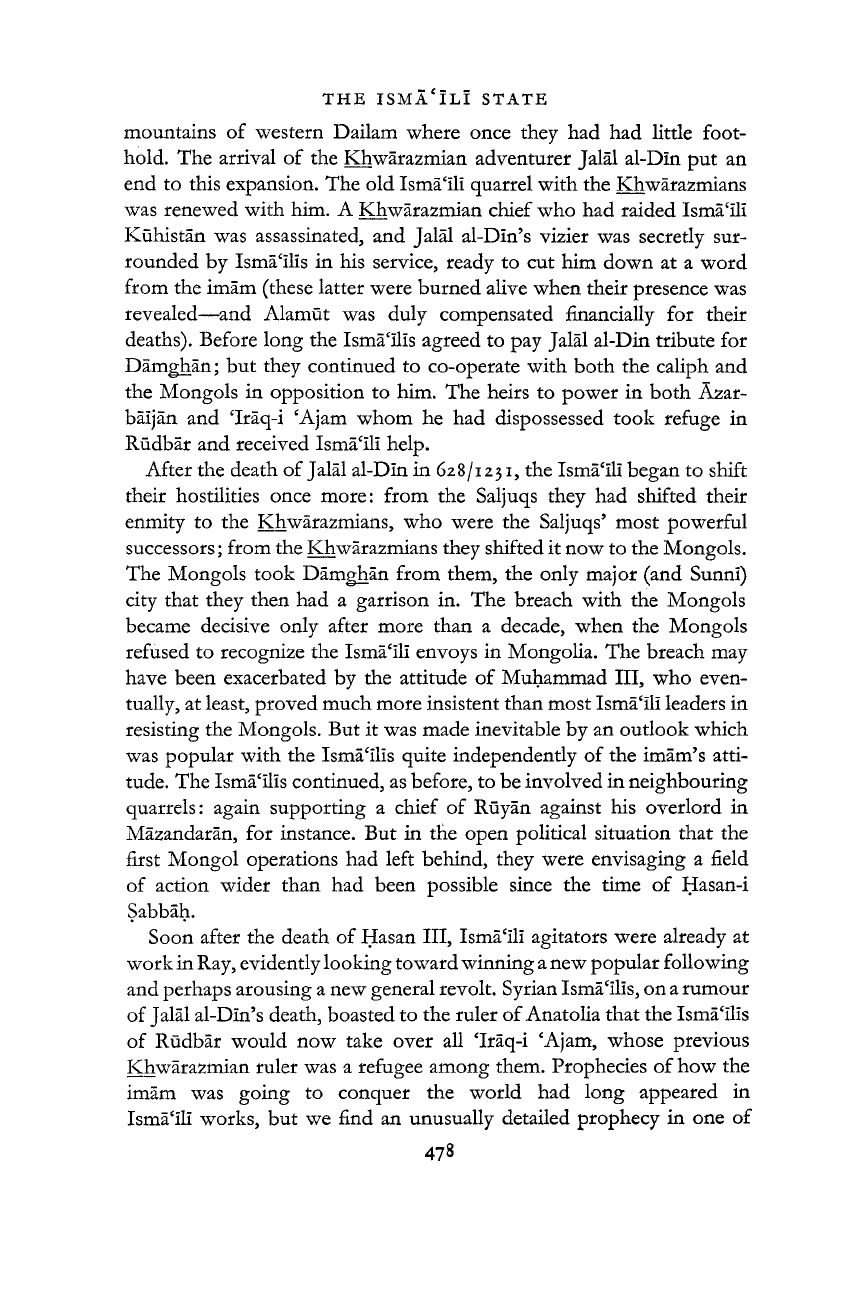
THE
ISMA'ILI
STATE
478
mountains of western Dailam where once they had had little foot-
hold. The arrival of the Khwarazmian adventurer Jalal al-Din put an
end to this expansion. The old Isma'ili quarrel with the Khwarazmians
was
renewed with him. A Khwarazmian
chief
who had raided Isma'ili
Kuhistan was assassinated, and Jalal al-Din's vizier was secretly
sur-
rounded by Isma'ilis in his service, ready to cut him down at a word
from
the imam (these
latter
were burned alive when their presence was
revealed—and Alamut was duly compensated financially for their
deaths). Before long the Isma'ilis agreed to pay Jalal al-Din
tribute
for
Damghan; but they continued to co-operate with both the caliph and
the Mongols in opposition to him. The heirs to power in both
Azar-
baijan and 'Iraq-i
'Ajam
whom he had dispossessed took refuge in
Rudbar and received Isma'ili help.
After
the death of Jalal al-Din in
628/1231,
the Isma'ili began to shift
their hostilities once more: from the Saljuqs they had shifted their
enmity to the Khwarazmians, who were the Saljuqs' most powerful
successors;
from the Khwarazmians they shifted it now to the Mongols.
The
Mongols took Damghan from them, the only major (and Sunni)
city
that
they
then
had a garrison in. The breach with the Mongols
became decisive only after more
than
a decade, when the Mongols
refused to recognize the Isma'ili envoys in Mongolia. The breach may
have
been exacerbated by the
attitude
of Muhammad III, who even-
tually,
at least, proved much more insistent
than
most Isma'ili leaders in
resisting the Mongols. But it was made inevitable by an outlook which
was
popular with the Isma'ilis quite independently of the imam's atti-
tude. The Isma'ilis continued, as before, to be involved in neighbouring
quarrels: again supporting a
chief
of Riiyan against his overlord in
Mazandaran, for instance. But in the open political situation
that
the
first
Mongol
operations had left behind, they were envisaging a field
of
action wider
than
had been possible since the time of Hasan-i
Sabbah.
Soon
after the death of Hasan III, Isma'ili agitators were already at
work
in
Ray,
evidently
looking
toward winning a new popular following
and perhaps arousing a new general revolt. Syrian Isma'ilis, on a
rumour
of
Jalal al-Din's death, boasted to the ruler of
Anatolia
that
the Isma'ilis
of
Rudbar would now take over all 'Iraq-i
'Ajam,
whose previous
Khwarazmian
ruler was a refugee among them. Prophecies of how the
imam was going to conquer the world had long appeared in
Isma'ili works, but we find an unusually detailed prophecy in one of
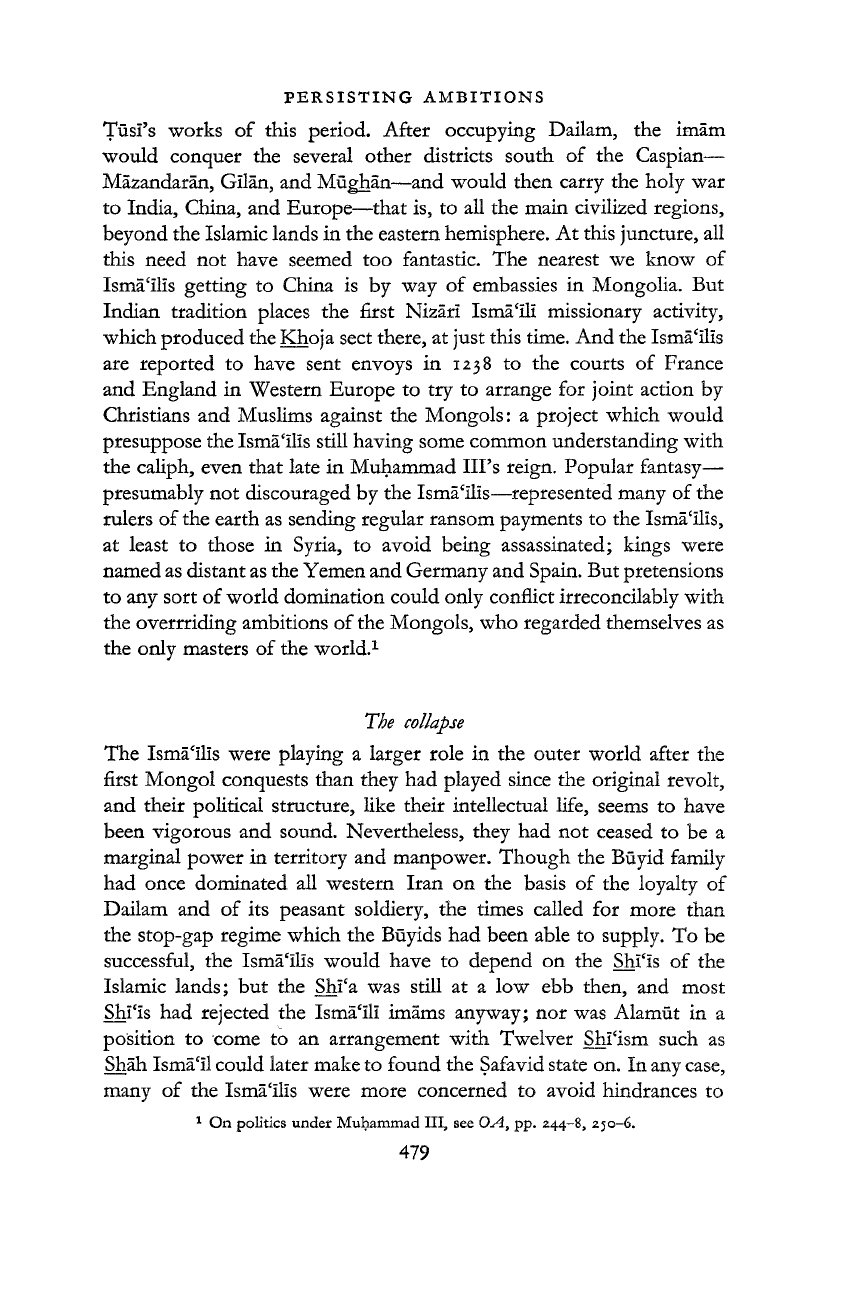
PERSISTING
AMBITIONS
Tusi's
works of this period. After occupying Dailam, the imam
would
conquer the several other districts south of the Caspian—
Mazandaran, Gllan, and Mu
ghan—and would
then
carry the holy war
to India, China, and Europe—that is, to all the main
civilized
regions,
beyond
the Islamic lands in the eastern hemisphere. At this juncture, all
this need not have seemed too fantastic. The nearest we know of
Isma'ills getting to China is by way of embassies in Mongolia. But
Indian tradition places the first Nizarl Isma'ili missionary activity,
which
produced the Khoja sect there, at just this time. And the Isma'ills
are reported to have sent envoys in 1238 to the courts of France
and England in Western Europe to try to arrange for joint action by
Christians and Muslims against the Mongols: a project which would
presuppose the Isma'ills still having some common understanding with
the caliph, even
that
late in Muhammad Ill's reign. Popular fantasy—
presumably not discouraged by the Isma'ills—represented many of the
rulers of the
earth
as sending regular ransom payments to the Isma'llis,
at least to those in Syria, to avoid being assassinated; kings were
named as
distant
as the
Yemen
and Germany and Spain. But pretensions
to any sort of world domination could only conflict irreconcilably with
the overrriding ambitions of the
Mongols,
who regarded themselves as
the only masters of the world.
1
The
collapse
The
Isma'ills were playing a larger role in the outer world after the
first
Mongol
conquests
than
they had played since the original revolt,
and their political structure, like their intellectual
life,
seems to have
been vigorous and sound. Nevertheless, they had not ceased to be a
marginal power in territory and manpower. Though the Buyid family
had once dominated all western
Iran
on the basis of the loyalty of
Dailam
and of its peasant soldiery, the times called for more
than
the stop-gap regime which the Buyids had been able to supply. To be
successful,
the Isma'ills would have to depend on the Shi'is of the
Islamic lands; but the Shi'a was still at a low ebb then, and most
Shi'is
had rejected the Isma'ili imams anyway; nor was Alamut in a
position to come to an arrangement with Twelver Shi'ism such as
Shah Isma'il could later make to found the Safavid
state
on. In any case,
many of the Isma'ills were more concerned to avoid hindrances to
1
On politics
under
Muhammad III, see OA, pp.
244-8,
250-6.
479
